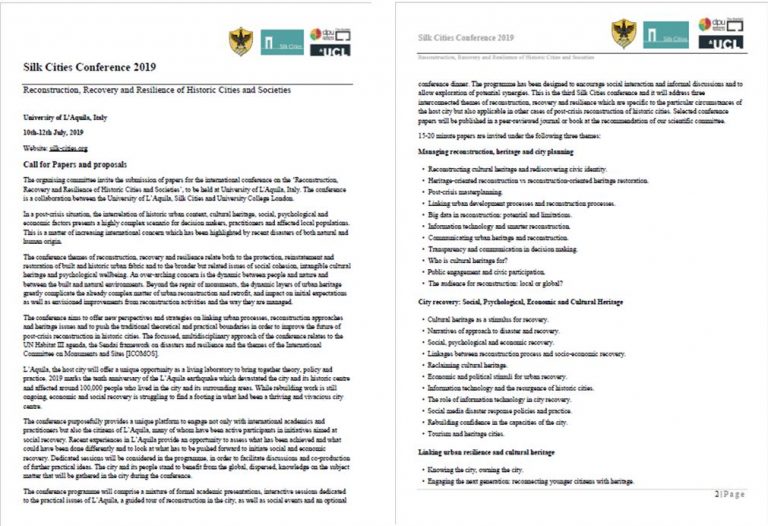Conference Details

Call for Papers: Conference Themes & Guiding Sub-themes
Conference themes vertically address three interconnected notions of reconstruction, recovery and resilience, and horizontally they stem from the particular circumstances of the host historic city that nevertheless are also applicable in other cases of post-crisis reconstruction of historic cities, such as protection, reinstatement and restoration of built and historic urban fabric and to the broader but related issues of social cohesion, intangible cultural heritage and psychological wellbeing, information technology, communication and transparency and the linkages between reconstruction and urban development.
15 minute proposals for papers and non-paper presentations are invited under the following three themes and guiding sub-themes:
Managing reconstruction, heritage and city planning
- Reconstructing cultural heritage and rediscovering civic identity.
- Heritage-oriented reconstruction vs reconstruction-oriented heritage restoration.
- Post-crisis masterplanning.
- Linking urban development processes and reconstruction processes.
- Big data in reconstruction: potential and limitations.
- Information technology and smarter reconstruction.
- Communicating urban heritage and reconstruction.
- Transparency and communication in decision making.
- Who is cultural heritage for?
- Public engagement and civic participation.
- The audience for reconstruction: local or global?
City recovery: Social, Psychological, Economic and Cultural Heritage
- Cultural heritage as a stimulus for recovery.
- Narratives of approach to disaster and recovery.
- Social, psychological and economic recovery.
- Linkages between reconstruction process and socio-economic recovery.
- Reclaiming cultural heritage.
- Economic and political stimuli for urban recovery.
- Information technology and the resurgence of historic cities.
- The role of information technology in city recovery.
- Social media disaster response policies and practice.
- Rebuilding confidence in the capacities of the city.
- Tourism and heritage cities.
Linking urban resilience and cultural heritage
- Knowing the city, owning the city.
- Engaging the next generation: reconnecting younger citizens with heritage.
- Pre-crisis masterplanning and preparedness.
- Risk communication and public awareness in in historic cities.
- Cultural heritage as a mean to building resilience.
- Smarter cities, data sharing and risk modelling.
- Information technology and civic resilience.
